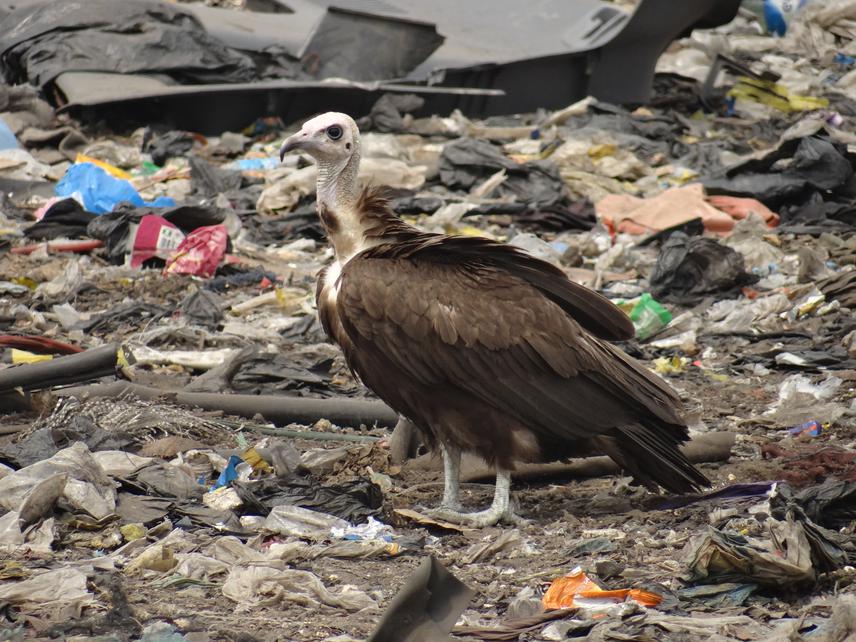Fidelis Akunke Atuo
Other projects
27 Jan 2014
Trade on Avian Body Parts: Implication for Biodiversity Conservation in South-Eastern Nigeria
21 Dec 2018
Assessing the Prevalence and Drivers of Wildlife Poisoning in a Tropical Biodiversity Hotspot
Our study aims to reduce the prevalence of trade on wildlife derivatives in south-east Nigeria.

Hooded vulture.
Many cultures in Africa, require wildlife derivatives for a variety of traditional and religious practices. This has resulted in the persecution of more than 354 bird species across the continent (Williams et al. 2014). Threatened species that are particularly targeted by traditional practices include but not limited to globally threatened birds such as the Hooded Vulture, Martial Eagle, and the Grey Parrot. These species are likely to experienced significant declines if their illegal hunting persist. Recent studies (Atuo et al. 2015; Buij et al. 2015) indicated that bones, heads, feet, and feathers of vultures and other bird species are highly sought after for their perceived powers in communicating with or casting out evil spirits, treatment of afflictions, and in traditional ceremonies. In Africa, Nigeria ranked above other countries in terms of the intensity at which wildlife species are persecuted for their body parts (Williams et al. 2014; Nikolaus 2001). This trend where selected species are constantly hunted and sold in traditional practice market was recently identified as a major driver of population decline in the Hooded Vulture and other raptor species (Buij et al. 2015) in Africa. The Hooded Vulture, once considered the most abundant and wide spreed of the African vulture species is experiencing an extremely rapid population decline (BirdLife International 2016) and was recently up-listed as “Critically Endangered” under the IUCN/BirdLife threat category http://www.birdlife.org/datazone/speciesfactsheet.php?id=3372.
Our project will fulfil four major objectives:
1. Identify the cultural and economic drivers of trade on wildlife derivatives focusing on trade in birds body parts.
2. Identify determinants of compliance with wildlife protection laws among indigenous people living in proximity to protected areas in the southeastern Nigeria. This will be important in developing conservation action plans that will best protect vulnerable species.
3. Estimate prevalence rates of avian body parts trade and identify vulnerable species.
4. Community based conservation awareness campaigns aimed at changing local attitude towards wildlife persecution.
Research description
Questionnaire surveys: Surveys will be carried out in 27 communities living in proximity to the three main protected areas in Cross River State (i.e. Afi Mountain Wildlife Sanctuary, Mbe Mountains Community Wildlife Sanctuary, and the Cross River National Park). Apriori selection of surveyed villages will be done by randomly drawing the required number of villages without replacement from a pool of all the villages surrounding each protected area. In each of the selected community, we will obtain permission to carry out our study from the community chief. Within each community, we will interview not less than 15 people across different age classes. In order to identify persecuted species, we will used the field guide to the birds of Western Africa (Borrow and Demey 2008). Using the field guide, we will show birds’ pictures to each respondent so as to confirm the species involved and translate bird’s names from local dialects to English. Conservation awareness: Our awareness campaigns will be carried out at three levels.
Community meetings: All sampled communities will be visited and conservation meetings will be held with local chiefs and community leaders. During such meetings, community leaders will be exposed to the important ecological role that birds play and the danger of losing species. Our previous studied identified high prevalence of illegal wildlife body parts trade among hunters and farmers, we will hold special meetings with hunters’ and farmers’ groups in each community. During meetings, we will lobby these groups to develop a group monitoring scheme that will check and report illegal harvest of endangered bird species.
Conservation Posters: Not less than 1000 posters bearing conservation messages will be produced and distributed during community and focus group meetings.
Television talk shows: our television awareness campaign will target a wider audience of over 1000, 000 people within coverage of the Cross River Broadcasting Cooperation (CRBC). We will build on already established links with the CRBC to complete at least two talk shows with focus on the dangers of illegal trade on wildlife body parts on the region’s avifauna.